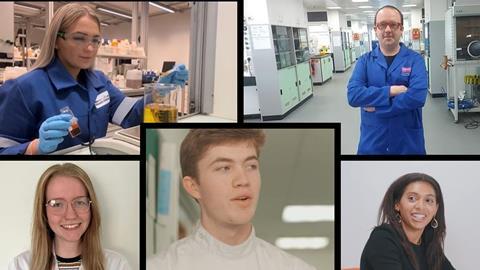Technicians are at the forefront of cutting-edge scientific research and provide vital scientific services
At a glance
- What laboratory technicians do: Laboratory technicians carry out practical work to support experiments from making sure our food and water are safe to consume, to advancing discoveries in medicine and reducing pollution. They prepare and test samples, record results, analyse data, report on findings and maintain laboratory equipment.
- Where laboratory technicians work: Laboratory technicians are employed in schools, universities, hospitals, plus a whole range of industries and research settings.
- Routes into becoming a laboratory technician: After studying science in school or college, you can earn while you learn or study full time.
Read on to find out more or explore laboratory technicians’ job profiles below.
Real-life stories from real-life laboratory technicians

- Jamie works alongside scientists to deliver a service to support the criminal justice system
- Katty monitors the levels of organic materials in drinking and wastewater to ensure it is safe to drink
- Celine develops ways to alter the structure of plastics so they biodegrade in the natural environment
- Emma collects and processes precious metals that are extracted from electronic waste products
- Joseph helps ensure there is clean, safe, water for 15 million people in the UK
- Kasia makes lubricants to improve the performance of metal-cutting tools
- Rebekka tests and finds ways to improve solar panels
- Sandrine works with teachers to design and safely prepare classroom chemistry experiments
- Christopher fixes and maintains laboratory equipment for a pharmaceutical manufacturer
- Olivia uses analytical techniques to ensure that food products meet legislative requirements for consumers
- Mike ensures that chemistry practicals run smoothly for everyone using the University of Manchester labs.
- Tyler carries out experiments linked to lung diseases
What laboratory technicians do
Laboratory technicians are highly skilled specialists who play an essential role in supporting the advancement of scientific knowledge, discoveries and technologies through the practical work they carry out in their organisation. They are often working at the forefront of cutting-edge research, from improving technologies for renewable energy to developing biodegradable materials to help with waste recycling. Laboratory technicians also provide critical services to the public, from testing the purity of food and water samples to carrying out tests that help with diagnosing and treating diseases. Laboratory technician roles are diverse, hands-on and the day-to-day tasks they carry out are varied.
Their work normally involves:
- Practical work. Laboratory technicians carry out hands-on work within a laboratory setting following quality, health and safety procedures at all times. They set up and perform repeat experiments using scientific equipment and practical techniques such as distillation, titration, spectroscopy and chromatography. For example, a laboratory technician could be involved in using analytical techniques to determine the nutritional values in food.
- Measuring and recording data. Laboratory technicians need to ensure that their measurements are as accurate as possible to ensure the data recorded is as reliable as possible. For example, a laboratory technician could be involved in measuring levels of organic materials in water samples to test drinking water.
- Maintaining laboratory equipment. Laboratory technicians calibrate (adjust) equipment to ensure it takes accurate measurements. They will also clean equipment where necessary to ensure it is in the best condition and might be involved in setting up equipment for experiments, such as preparing practical activities in a school or university. Laboratory technicians are often experts in their area of work and will often identify and flag issues with equipment, ensuring that fixes can be made swiftly so that the laboratory equipment is functionally optimally.
- Data analysis. Laboratory technicians need to analyse, understand and explain the data they collect. This might involve using a digital system to calculate values and applying statistical methods to interpret results. The types of data laboratory technicians analyse is highly varied as it depends on the sector they work within. Data analysis involves analytical, problem-solving and mathematical skills.
- Problem solving. Laboratory technicians need to improve processes and identify errors, report errors to their laboratory team and carry out work to minimise errors in future. This requires critical thinking, a keen eye for detail and innovation.
- Autonomy and teamwork. Laboratory technicians carry out work both on their own and within their team. They report on their findings to their laboratory team and help them to adhere to the highest possible standards. Working both independently and within a team requires strong autonomy and communication skills.
Where laboratory technicians work
Laboratory technicians work in a diverse range of settings – any institution that carries out scientific or technical work is likely to employ technicians to support the practical activities that are carried out there. This means that there is wide scope for laboratory technicians to be employed across a wide range of fields. Here are some examples of where laboratory technicians may work:
- Educational settings such as a school or college
- Universities and research institutions
- Hospitals, dental laboratories and veterinary laboratories
- Pharmaceutical and biotechnology companies
- Food and water companies
- Chemical manufacturing companies
- Environmental agencies
- Forensic laboratories
Routes into becoming a laboratory technician
There are different routes into becoming a laboratory technician. For example, completing A-levels in science subjects or a Science T level, followed by a higher or degree apprenticeship, foundation degree (FdSc), Higher National Certificate (HNC) or Higher National Diploma (HND). Find out more about apprenticeships and the different types available.
Further links to find out more about laboratory technicians’ roles:













